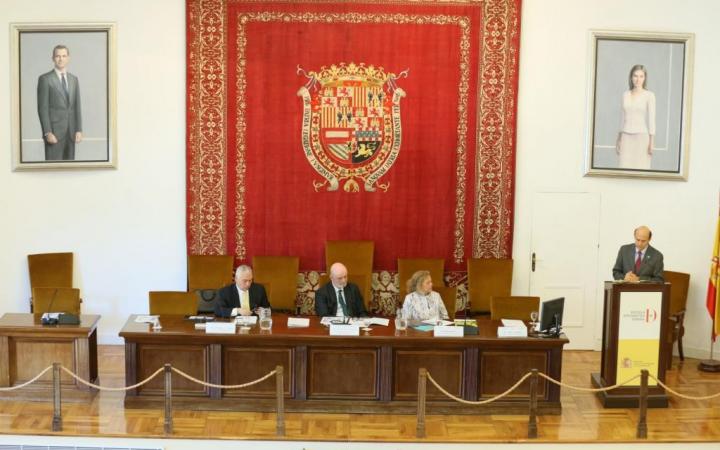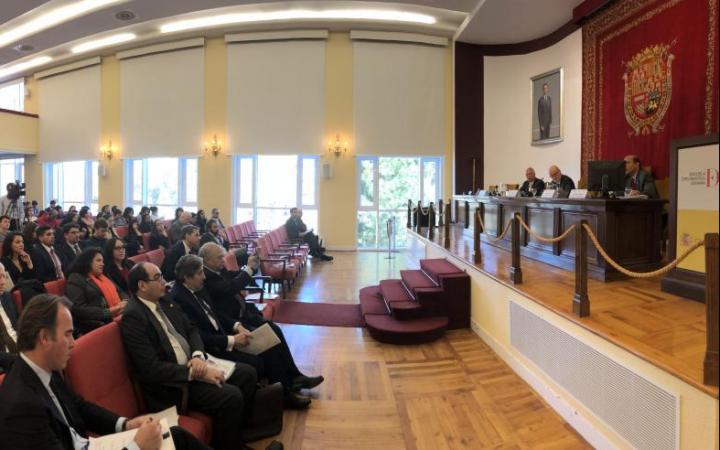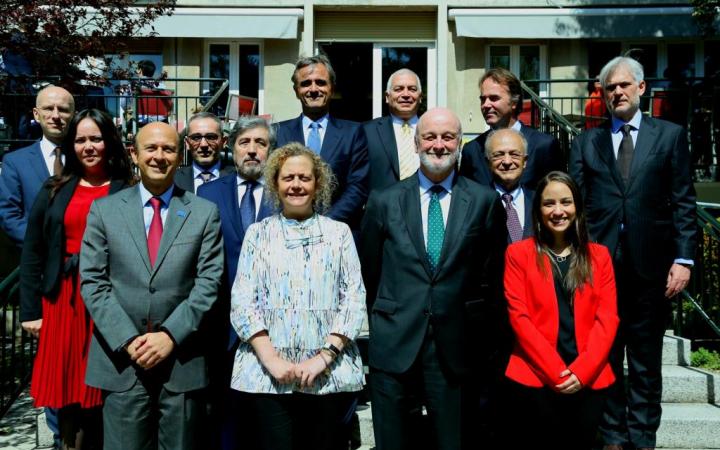16 April 2018, Madrid, Spain - The United Nations Institute for Training and Research (UNITAR) organized the Madrid International Conference on “Strengthening Preventive Diplomacy and Multilateral Negotiation” in close collaboration with the Sustainable Development Goals Fund (SDG-Fund), which was hosted at the Escuela Diplomática España (Diplomatic School of Spain). The conference served as the follow up phase of the previous New York preparatory briefing on 31 October 2017 with the key note participation of Under Secretary-General Ms. Ana Maria Menendez, Assistant Secretary-General Mr. Alexandre Zouev, SDG Fund Director Dr. Paloma Duran, Columbia Law School Professors Ms. Alexandra Carter and Mr. Shawn Watts and Head of UNITAR New York Office Mr. Marco A. Suazo. This forum focused primarily on the revitalization of the preventive diplomacy discourse within the United Nations system which is spearheaded by the United Nations Secretary-General Mr. António Guterres, the ways in which conflict prevention and multilateral negotiation can be integrated in the achievement of the 2030 Agenda for Sustainable Development and its various crosscutting goals and targets in particular the implementation of SDG 16: Peace, justice and strong institutions.
The conference was developed in three individual panels. Almost 300 invitees were received with a warm welcome from the organizers, Mr. Ramon Gil-Casares, Dr. Paloma Duran and Mr. Marco A Suazo, who introduced the video specially dedicated to the conference as a tool for the High-Level Meeting on Peacebuilding and Sustaining Peace by the current President of the General Assembly, H.E. Mr. Miroslav Lajčák.
Mr. Lajcak remarked how Preventive Diplomacy is one of the main priorities of his presidency. He presented the tools the United Nations has been enhancing to support the initiative but acknowledged that efforts must be increased, and urged the attendees to act sooner and quicker to prevent conflicts and sustain peace. The video was very well received by the participants with an interactive discussion on the agenda of the President of the General Assembly and a deep interest in the different tools and measures that he mentioned during his intervention.
The conference was developed in three individual panels. Almost 300 invitees were received with a warm welcome from the organizers, Mr. Ramon Gil-Casares, Dr. Paloma Duran and Mr. Marco A Suazo, who introduced the video specially dedicated to the conference as a tool for the High-Level Meeting on Peacebuilding and Sustaining Peace by the current President of the General Assembly, H.E. Mr. Miroslav Lajčák.
Mr. Lajcak remarked how Preventive Diplomacy is one of the main priorities of his presidency. He presented the tools the United Nations has been enhancing to support the initiative but acknowledged that efforts must be increased, and urged the attendees to act sooner and quicker to prevent conflicts and sustain peace. The video was very well received by the participants with an interactive discussion on the agenda of the President of the General Assembly and a deep interest in the different tools and measures that he mentioned during his intervention.
Ambassador Mr. Gil Casares introduced the key note speaker, President and Chief Executive Officer of the Foreign Policy Association, Mr. Noel V. Lateef who leads the organization at inspiring the American public to learn about global issues. Mr. Lateef used a practical example of two diplomats doubting whether to intervene or remain inactive as the proof of the need for Preventive Diplomacy. Mr. Lateef addressed the linkage between development and peace, situating SDG 16 as a crucial objective for the achievement of the 2030 Agenda. Preventive Diplomacy has to be implemented by all stakeholders as it is too hard, intellectually, technically and politically for individual parties. Many of the ideas that were introduced once the floor was opened for discussion were, early mediation, dedicated units for preventive diplomacy, specific training for the involved staff and a roster of experts on call. Mr. Lateef referred to the newly graduated diplomats as, “future Ambassadors of Spain and the world”.
Panel I- European Perspectives
Following a brief break, Mr. Rory Keane, Head of the United Nations Liaison Office for Peace and Security, Brussels, opened the panel on European perspectives. Mr. Keane acknowledged how traditional conflicts have been replaced for more fragmented interstate conflicts, involving many groups and areas. Only through the use of regional offices and the use of regional rapporteurs would allow prevention to be placed higher on the political agenda.
Ambassador Mr. Dan Petre, General Director of the Romanian Diplomatic Institute, brought to the panel the differences between peace and lack of conflict by using Romania’s geopolitical perspective. He stated that all stakeholders play a major role in conflict prevention. H.E. Mr. Bartjan Wegter, Deputy Ambassador of the Netherlands to Spain, followed the discussion with two vital points, the role of refugees as advocates for peace when they return to their countries, and how conflict may arise in post-conflict situations, given the fragility of the states when negotiations conclude. Bringing to the table the Italian perspective, Mr. Giampaolo Neri, Deputy Director from the Italian Diplomatic Institute, went through a diverse example of case studies, such as 1325 resolution which endorses women as vital agents for peace or the Mediterranean Women Mediators Network where Italy has played a key role recognizing the importance of gender equality for peace processes. Furthermore, H.E. Mr. Przemysław Wyganowski, Deputy Director of the Diplomatic Academy of the Ministry of Foreign Affairs of the Republic of Poland, illustrated the importance of training polish diplomats, not only on negotiation but fair mediation, fighting corruption and promoting good governance.
Panel II- Latin American and Spanish Perspectives
After an interactive Q&A, where the audience got a wide picture of what the implementation of the SDG 16 entails, Mr. Ignacio Morro, Director for Spain of United Nations and Human Rights, Spanish Ministry of Foreign Affairs, opened the afternoon panel which focused on Spain and Latin American perspectives. Mr Morro emphasized the imperative of a shift of the current reactive response to that of a preventive position. Spain’s Security Council membership during 2015-2016 placed the host country of this conference as one of the main European drivers of the mediation processes with the “European Union Friends of Mediation” initiative which also focused on the necessary inclusion of the younger generations. H.E. Mr. Diego Cardona, Director, Diplomatic Academy of Colombia-Augusto Ramírez Ocampo continued the discussion with case study of Colombian Peace Process and how the climax for an agreement was created in this particular case, using neutral and observing countries through the whole process, renewing the agreement on a yearly basis and concluded reiterating the existent connection between peace and development. H.E. Mr. Juan Andrés Cardozo Dominguez, Director of the Diplomatic and Consular Academy of Paraguay, used philosophy to prove that from Voltaire to Khan, preventive diplomacy has been reinforced through the course of the years, using tolerance and global responsibility as driving forces of the conflict prevention process. Representing Guatemala’s Diplomatic Academy, the Director H.E. Mr. Luis Alberto Padilla, went through different case studies of Central America, as examples of prevention while supporting the implementation of the 2030 agenda in a holistic manner. Concluding and closing the afternoon discussion, Ms. María Gabriela Egas from Ecuador Ministry of Foreign affairs, presented Ecuador’s strategy to develop a curriculum of promotion of multilateralism involving the themes of disarmament, gender and human mobility.
The conference was closed with remarks of the host Mr. Gil Casares, who thanked all the involved panelists and the participative audience for the fruitful conversations, the analyzed case studies and the different perspectives shared throughout the day.




